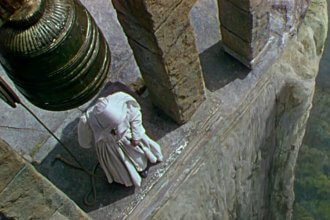When I stumbled across Mute on Netflix, I was fairly excited. Duncan Jones, the man who brought us Moon and Source Code, directed it. Surely it would be an excellent sci-fi noir piece…Right?
Silence vs. Loudness
Mute centers around an Amish man named Leo (Alexander Skarsgård) who had a terrible accident when he was young that ruined his vocal chords. Leo loves Naadirah (Seyneb Saleh), a server with a mysterious past who works at a racy, futuristic nightclub. Right when she is about to tell Leo everything, she disappears, sending Leo on an hour and a half journey to figure out what happened to her. It proves to be difficult, as he cannot outright communicate with others.
Skarsgård does what he can with the mute role, but he is given only so much material to work with. For most of the film it is hard to connect and feel for this character that we are supposed to care about as he goes around smashing heads and aggressively holding notes and pictures in front of people’s faces. That being said, he does have certain moments with Naadirah where we see him play a shy, loving type. This contrasts with the harsh and merciless man that he becomes later. It is also interesting to watch Leo, an Amish man, interact in a city filled to the brim with technology, particularly when he must figure out how to use some of it to try to find Naadirah. One of his most shining moments is when he meets the young daughter of Cactus Bill (Paul Rudd).
Now, Cactus is the exact opposite of Leo. He is loud, lewd, and violent. He is a deserter from the United States Army, and together with his friend Duck (Justin Theroux), he tortures people for the underworld in hopes of earning a new life for him and his daughter. Paul Rudd typically plays funny and ridiculous characters, so it is intriguing to see him play a grittier and more serious role. Though for most of the film it is hard to see how their story connects to Leo’s, Cactus and Duck are more exciting to watch as they do everything from bantering, torturing, bowling, and drinking together. One moment they are calling each other “babe,” and the next they are at each other’s throats for sometimes serious, oftentimes trivial matters. But underneath their hard and boisterous exteriors lies a love for Cactus Bill’s daughter. In fact, it is hard to care for Leo’s plight when these two are on screen.
Pacing is Everything
 At two hours and six minutes long, Mute could have benefited from some more attention in the editing room. The visuals of the futuristic city are great and most of the main characters are great, but the film suffers from slow and uneven pacing in the beginning. Leo, for instance, spends several scenes showing us how much he loves Naadirah. He gives her gifts, defends her honor, takes her out on a date, makes her tea, etc. This lasts for nearly the first forty minutes of the movie. Consolidating some of these scenes would have helped the film immensely, but as it stands, many viewers may check out within the first half of Mute.
At two hours and six minutes long, Mute could have benefited from some more attention in the editing room. The visuals of the futuristic city are great and most of the main characters are great, but the film suffers from slow and uneven pacing in the beginning. Leo, for instance, spends several scenes showing us how much he loves Naadirah. He gives her gifts, defends her honor, takes her out on a date, makes her tea, etc. This lasts for nearly the first forty minutes of the movie. Consolidating some of these scenes would have helped the film immensely, but as it stands, many viewers may check out within the first half of Mute.
It is unfortunate, for the film does partly redeem itself in the last half. The pace is faster; the scenes hold more weight; there are many surprising (and some predictable) reveals; and it all climaxes with Leo’s encounter with the truth about Naadirah.
Melting Maketh Man
Mute begins with an Amish proverb that reads, “In order to mold his people, God often has to melt them.” Throughout the film, Leo and Cactus Bill are being melted. Both become violent during the process, both for reasons that they believe to be right. Leo eventually comes out of his molding and becomes the man that he was meant to be; Cactus Bill breaks out as well, but his metamorphosis is not what he had hoped. So often in this life, God puts events or people in our melting pot. How we react to these situations will result in either our molding or shattering. I would hope that this melting process would not involve going on a smashing or torturing spree, but Mute’s observance of this progression is a thought-provoking one that may bring up some discussion. It is a shame, then, that Mute’s interesting themes and characters are bogged down by a slow and unmotivated first half that may turn many away.





